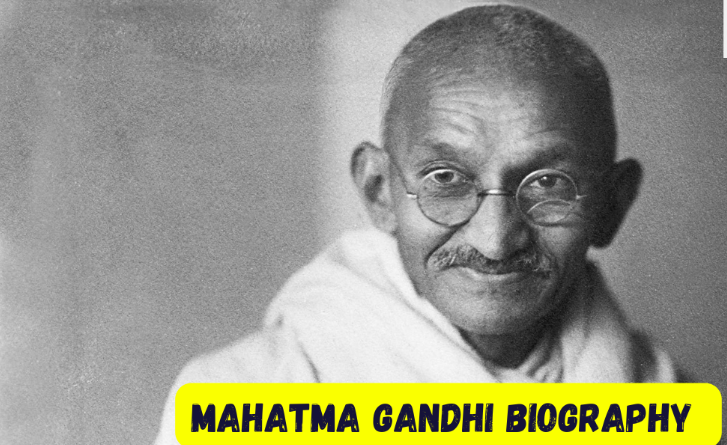Even today, Mahatma Gandhi’s life and methods of struggle continue to inspire people. The true measure of a person’s greatness lies in their ability to influence positive change in others, and Gandhi’s life exemplifies this. Decades after his passing, many individuals have transformed their lives for the better after learning about him. Let’s take a closer look at Mahatma Gandhi’s life, his movements, his famous quotations, and more. Explore his legacy this Martyr’s Day!
Mohandas Karamchand Gandhi, famously known as Mahatma Gandhi, was a prominent freedom activist and influential political leader pivotal to India’s fight for independence against British colonial rule. Revered as the father of the nation, he significantly uplifted the lives of India’s impoverished populace. His birthday is commemorated annually as Gandhi Jayanti. Gandhi’s principles of truth and non-violence resonated widely, inspiring figures like Martin Luther King Jr. and Nelson Mandela in their respective movements for justice and equality.
Biography of Mahatma Gandhi
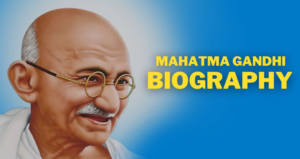
Full Name: Mohandas Karamchand Gandhi
Born: 2 October, 1869
Place of Birth: Porbandar, Gujarat
Death: 30 January, 1948
Place of Death: Delhi, India
Cause of Death: Shot by Gun or assassination
Father: Karamchand Gandhi
Mother: Putlibai Gandhi
Nationality: Indian
Spouse: Kasturba Gandhi
Children: Harilal Gandhi, Manilal Gandhi, Ramdas Gandhi and Devdas Gandhi
Professions: Lawyer, Politician, Activist, Writer
For nearly two decades in South Africa, Mahatma Gandhi actively protested against injustices and racial discrimination through non-violent means of protest. His humble and minimalist lifestyle earned him admiration, both within India and internationally, leading to his popular moniker, “Bapu” or Father.
Mahatma Gandhi: Early Life and Family Heritage
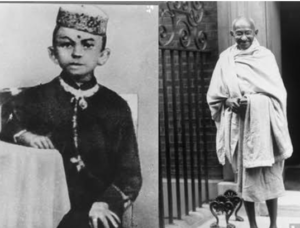
Born on October 2, 1869, in Porbandar, Gujarat, Mahatma Gandhi was the son of Karamchand Gandhi and Putlibai. At the tender age of 13, he entered into an arranged marriage with Kasturba. Together, they were blessed with four sons: Harilal, Manilal, Ramdas, and Devdas. Kasturba wholeheartedly supported her husband in all his pursuits until her passing in 1944.
Mahatma Gandhi’s father served as the Dewan or Chief Minister of Porbandar, a small principality in Western British India, which is now part of Gujarat State. He was born to his father’s fourth wife, Putlibai, who hailed from a prosperous Vaishnava family. During his formative years, Gandhi was profoundly influenced by the tales of Shravana and Harishchandra, which underscored the significance of truthfulness.
Education of Mahatma Gandhi
At the age of 9, Gandhi enrolled in a local school in Rajkot, where he received instruction in arithmetic, history, geography, and languages. By age 11, he transitioned to a high school in Rajkot. However, his studies were interrupted for approximately a year due to his marriage. Despite this setback, he eventually resumed and completed his schooling. In 1888, Gandhi enrolled at Samaldas College in Bhavnagar, Gujarat. However, feeling dissatisfied with his education there, he seized the opportunity to pursue further studies in law in London, thanks to encouragement from a family friend, Mavji Dave Joshi. To assuage concerns, Gandhi assured his mother and wife that he would abstain from consuming non-vegetarian food, alcohol, and engaging in relationships with women during his time abroad.
In 1888, Mahatma Gandhi departed for London to pursue a legal education. Within 10 days of his arrival, he enrolled at the Inner Temple, one of London’s four prestigious law colleges, where he diligently studied and practiced law. During his time in London, Gandhi became affiliated with a Vegetarian Society, through which he was introduced to the Bhagavad Gita by some of his vegetarian acquaintances. The teachings of the Bhagavad Gita left a lasting impression on him and significantly influenced his life.
Mahatma Gandhi: His Time in South Africa
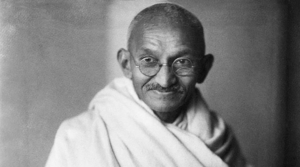
In May 1893, Mahatma Gandhi traveled to South Africa to practice law. However, he encountered firsthand the pervasive racial discrimination prevalent in the country. Despite holding a first-class ticket, Gandhi was forcibly removed from the first-class compartment of a train, as it was designated exclusively for white passengers, barring Indians and black individuals from such accommodations. This experience deeply impacted Gandhi, prompting him to vehemently oppose racial discrimination. Additionally, he witnessed similar incidents of mistreatment against his fellow Indians, who were disparagingly referred to as “coolies.”
On May 22, 1894, Gandhi founded the Natal Indian Congress (NIC) with the aim of advocating for the rights of Indians in South Africa. Through dedicated efforts, Gandhi swiftly rose to prominence as a leader within the Indian community in the region. He drew inspiration from the Tirukkural, an ancient Indian text originally composed in Tamil, which emphasized ethical principles. This influential work deeply resonated with Gandhi and contributed to his development of the concept of Satyagraha, or nonviolent resistance. In 1906, Gandhi put this philosophy into practice through a nonviolent protest. After spending 21 transformative years in South Africa, Gandhi returned to India in 1915. During his time in South Africa, Gandhi actively campaigned for civil rights, and his experiences there profoundly shaped his identity and beliefs.
Role of Mahatma Gandi in the Indian Independence Movement
In 1915, Mahatma Gandhi returned to India permanently and aligned himself with the Indian National Congress, where he found guidance and mentorship under Gopal Krishna Gokhale.
One of Gandhi’s earliest significant accomplishments occurred in 1918 when he spearheaded the Champaran and Kheda agitations in Bihar and Gujarat, respectively. Additionally, he played instrumental roles in leading various movements such as the Non-Cooperation Movement, Civil Disobedience Movement, Swaraj, and the Quit India movement, all aimed at challenging the British colonial rule.
Mahatma Gandhi: The Philosophy of Satyagraha
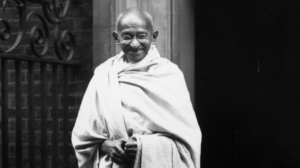
Gandhi coined the term Satyagraha to encapsulate his method of nonviolent resistance. This philosophy deeply influenced notable figures like Nelson Mandela and Martin Luther King Jr. in their quests for freedom, equality, and social justice. Rooted in principles of truth and nonviolence, Mahatma Gandhi’s Satyagraha remains a powerful symbol of peaceful resistance.
Death of Mahatma Gandhi
Mohandas Karamchand Gandhi met his tragic end on January 30, 1948, when he was assassinated by Nathuram Godse, a Hindu nationalist and member of the Hindu Mahasabha. Godse’s motivations stemmed from his belief that Gandhi was sympathetic to Pakistan and his opposition to Gandhi’s doctrine of non-violence.
Mahatma Gandhi: Literary Contributions
- “Hind Swaraj,” first published in Gujarati in 1909, serves as a seminal work reflecting Gandhi’s views on self-governance and societal transformation.
- Gandhi played a pivotal role in editing various newspapers, such as Harijan in Gujarati, Hindi, and English, along with Indian Opinion and Young India in English, and Navajivan, a monthly publication in Gujarati.
- Gandhi’s autobiographical masterpiece, “The Story of My Experiments with Truth,” offers profound insights into his life, beliefs, and experiments with nonviolence.
- Other autobiographical works by Gandhi include “Satyagraha in South Africa” and “Hind Swaraj or Indian Home Rule,” each providing valuable perspectives on his activism and vision for India’s independence.
Also Read This: Biography of PM Narendra Modi
Awards given to Mahatma Gandhi
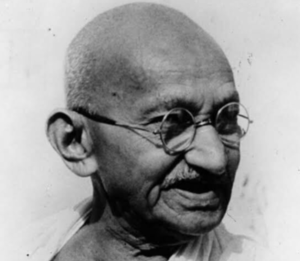
- In 1930, Gandhi was named the Man of the Year by Time Magazine.
- In 2011, Time magazine named Gandhi as one of the top 25 political icons of all time.
- He did not receive the Nobel Peace Prize despite being nominated five times between 1937 and 1948.
- The Government of India institutionalized the annual Gandhi Peace Prize to distinguished social workers, world leaders, and citizens. Nelson Mandela, the leader of South Africa’s struggle against apartheid was a recipient of the award.
Film made on Mahatma Gandhi
Ben Kingsley portrayed Mahatma Gandhi in the 1982 film titled “Gandhi,” which won the Academy Award for Best Picture.
Mahatma Gandhi’s legacy will endure eternally as he advocated for non-violence, truth, and faith in God, alongside spearheading India’s Independence movement. His principles and methodologies continue to inspire leaders and youth worldwide, transcending borders. In Indian history, he stands as an iconic figure, known for his simplicity in attire, often seen wearing a dhoti. Gandhi propagated the concept of swaraj (self-rule) and imparted invaluable lessons on achieving independence to the Indian populace.
Facts About Mahatma Gandhi
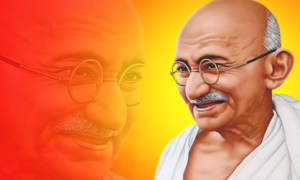
- Britannica notes that in 2007, the United Nations designated October 2nd, Gandhi’s birthday, as the International Day of Non-violence.
- Although widely known as Mahatma Gandhi, a symbol of nonviolent resistance and Indian independence, his journey began with the name Mohandas Karamchand Gandhi. Born in 1869, Mohandas’ life took a significant turn when he embraced the title that would shape his legacy: Mahatma.
- At the age of 13 in 1883, Mohandas Gandhi’s life underwent a significant transformation when he entered into an arranged marriage with Kasturba Makhanji, also 13 at the time.
- In 1930, the world witnessed India’s independence movement gaining momentum under Mahatma Gandhi’s leadership. His steadfast dedication to nonviolent resistance, his charm, and his ability to rally millions earned him Time Magazine’s Person of the Year title.
- Remaining true to his lifelong vegetarianism, Mr. Gandhi’s diet revolved around fresh vegetables, yogurt, fruits, seeds, and nuts.
FAQ’s
- What was Mahatma Gandhi’s full name?
– Mahatma Gandhi’s full name was Mohandas Karamchand Gandhi.
- When was Mahatma Gandhi born?
– Mahatma Gandhi was born on October 2, 1869.
- What is Mahatma Gandhi known for?
– Mahatma Gandhi is known for his leadership in India’s struggle for independence from British rule and for his philosophy of nonviolent resistance.
- What is the significance of Mahatma Gandhi’s birthday, October 2nd?
– October 2nd, Mahatma Gandhi’s birthday, is celebrated as the International Day of Non-violence by the United Nations.
- Did Mahatma Gandhi win the Nobel Peace Prize?
– Despite being nominated five times between 1937 and 1948, Mahatma Gandhi never won the Nobel Peace Prize.
